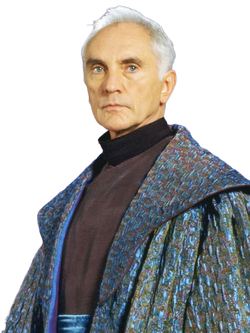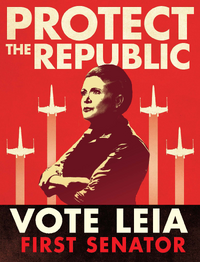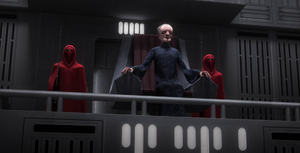mNo edit summary |
m (Adding backup links) |
||
| Line 53: | Line 53: | ||
{{Quote|If this body is not capable of action, I suggest new leadership is needed. I move for a Vote of No Confidence in Chancellor Valorum's leadership.|Padmé Amidala, to the Galactic Senate|Star Wars: Episode I The Phantom Menace}} |
{{Quote|If this body is not capable of action, I suggest new leadership is needed. I move for a Vote of No Confidence in Chancellor Valorum's leadership.|Padmé Amidala, to the Galactic Senate|Star Wars: Episode I The Phantom Menace}} |
||
[[File:ValorumPortrait-SWE.png|thumb|left|250px|Finis Valorum was the penultimate Supreme Chancellor who presided over a Senate rife with corruption.]] |
[[File:ValorumPortrait-SWE.png|thumb|left|250px|Finis Valorum was the penultimate Supreme Chancellor who presided over a Senate rife with corruption.]] |
||
| − | Supreme Chancellor Finis Valorum presided over a Senate that was perceived as highly corrupt and too bureaucratic to be an efficient government.<ref name="SenateHG" /> Although he governed the Republic with good intentions,<ref name="Valorum">{{Databank|supreme-chancellor-valorum|Supreme Chancellor Valorum}}</ref> Valorum was seen as an ineffective civil servant whose reputation was tarnished by accusations of corruption.<ref name="TPM" /> The Invasion of [[Naboo]] in [[32 BBY]] compelled [[Monarch of Naboo|Queen]] [[Padmé Amidala]] to beseech Valorum for his support against the [[Trade Federation]] and its occupation of her [[homeworld]].<ref name="Amidala">{{Databank|padme-amidala|Padmé Amidala}}</ref> However, under the advisement of [[Senator]] Palpatine,<ref name="TPM" /> Naboo's [[Galaxy|galactic]] representative<ref name="Amidala" /> and one of the queen's closest [[advisor]]s,<ref name="ROTS" /> Amidala called on the Senate to cast a [[Vote of No Confidence]] in the leadership of Chancellor Valorum.<ref name="Valorum" /> |
+ | Supreme Chancellor Finis Valorum presided over a Senate that was perceived as highly corrupt and too bureaucratic to be an efficient government.<ref name="SenateHG" /> Although he governed the Republic with good intentions,<ref name="Valorum">{{Databank|supreme-chancellor-valorum|Supreme Chancellor Valorum}}</ref> Valorum was seen as an ineffective civil servant whose reputation was tarnished by accusations of corruption.<ref name="TPM" /> The Invasion of [[Naboo]] in [[32 BBY]] compelled [[Monarch of Naboo|Queen]] [[Padmé Amidala]] to beseech Valorum for his support against the [[Trade Federation]] and its occupation of her [[homeworld]].<ref name="Amidala">{{Databank|padme-amidala|Padmé Amidala|archivedate=20170915230830}}</ref> However, under the advisement of [[Senator]] Palpatine,<ref name="TPM" /> Naboo's [[Galaxy|galactic]] representative<ref name="Amidala" /> and one of the queen's closest [[advisor]]s,<ref name="ROTS" /> Amidala called on the Senate to cast a [[Vote of No Confidence]] in the leadership of Chancellor Valorum.<ref name="Valorum" /> |
With Valorum removed from office, Palpatine was nominated to succeed him along with [[Bail Antilles]] and [[Ainlee Teem]] of [[Alderaan]] and [[Malastare]], respectively.<ref name="TPM" /> Palpatine ultimately defeated his fellow nominees due to widespread support and sympathy for his homeworld.<ref name="PalpatineBG">{{Databank|palpatine-biography-gallery|Palpatine Biography Gallery}}</ref> Although he vowed to restore integrity to the Senate, and to bring peace and prosperity to the Republic as a whole,<ref name="TPM" /> Palpatine would in fact be the last Supreme Chancellor in [[Timeline of galactic history|galactic history]].<ref name="ROTS" /> |
With Valorum removed from office, Palpatine was nominated to succeed him along with [[Bail Antilles]] and [[Ainlee Teem]] of [[Alderaan]] and [[Malastare]], respectively.<ref name="TPM" /> Palpatine ultimately defeated his fellow nominees due to widespread support and sympathy for his homeworld.<ref name="PalpatineBG">{{Databank|palpatine-biography-gallery|Palpatine Biography Gallery}}</ref> Although he vowed to restore integrity to the Senate, and to bring peace and prosperity to the Republic as a whole,<ref name="TPM" /> Palpatine would in fact be the last Supreme Chancellor in [[Timeline of galactic history|galactic history]].<ref name="ROTS" /> |
||
| Line 270: | Line 270: | ||
*{{Databank|galaxies-opera-house|Galaxies Opera House|archivedate=20170708191435}} |
*{{Databank|galaxies-opera-house|Galaxies Opera House|archivedate=20170708191435}} |
||
*{{Databank|mas-amedda|Mas Amedda}} |
*{{Databank|mas-amedda|Mas Amedda}} |
||
| − | *{{Databank|padme-amidala|Padmé Amidala}} |
+ | *{{Databank|padme-amidala|Padmé Amidala|archivedate=20170915230830}} |
*{{Databank|republic-cruiser|Republic Cruiser}} |
*{{Databank|republic-cruiser|Republic Cruiser}} |
||
*{{Databank|supreme-chancellor-valorum|Supreme Chancellor Valorum}} |
*{{Databank|supreme-chancellor-valorum|Supreme Chancellor Valorum}} |
||
Revision as of 01:07, 16 June 2019
| | |
Warning: The following parameters in the infobox are unrecognized: individuals, era
- "Now they will elect a new Chancellor, a strong Chancellor. One who will not let our tragedy continue."
- ―Sheev Palpatine, to Padmé Amidala
The Supreme Chancellor, also known as the High Chancellor and rarely referred to as the chief of state, was the head of state and head of government of the Galactic Republic. The chancellor directed both the executive and legislative—the Office of the Chancellor and the Galactic Senate, respectively—branches of government and, during the Clone Wars, was Commander-in-Chief of the Republic Military. As leader of the Galactic Senate, the chancellor owned an office suite in the Senate Office Building located on the Republic capital world of Coruscant. The chancellor was elected through a majority vote by and from the senators that represented the various worlds throughout the galaxy. The Galactic Constitution limited the chancellery to a four-year term that was renewable once; as such, no one was permitted to serve as chancellor for a third term. The constitution allowed for a chancellor to be removed from office through a majority-based Vote of No Confidence.
The chancellor presided over the Senate throughout the era of the Republic, which lasted for approximately one thousand years prior to the rise of the Galactic Empire. By the time of the Naboo Crisis, the chancellery had become virtually powerless and hampered by bureaucratic procedure, corporate interests and rampant corruption in the Senate. Disillusioned with the state of the government, Queen Padmé Amidala successfully called on the Senate to remove Supreme Chancellor Finis Valorum from office. Relying on a sympathy vote due to Naboo's predicament, one of the Queen's advisors, Senator Sheev Palpatine, was elected to succeed Valorum as Supreme Chancellor.
Chancellor Palpatine presided over the final years of the Republic, during which the constitution was amended due to the Separatist Crisis, allowing him to remain in office long after his second term ended. Pressured by the threat of open war for the first time in a thousand years, the Senate granted emergency powers to Palpatine at the expense of their own authority, effectively turning the chancellery into a dictatorship. At the height of the Clone Wars, the chancellor became even more powerful when the InterGalactic Banking Clan ceded control of its assets to the executive branch. Near the end of the war, Palpatine revealed his true identity as Darth Sidious, the Sith Lord who masterminded the conflict, to the Jedi Order. After the Jedi High Council attempted to arrest the chancellor, Palpatine decreed that all Jedi were enemies of the state, and therefore, subject to summary execution. With the Jedi removed as an obstacle and having gained unprecedented control over the Senate as well as the Supreme Court, Chancellor Palpatine proclaimed himself Emperor of the first Galactic Empire in 19 BBY.
Powers
- "If I may say so, Your Majesty, the Chancellor has little real power."
- ―Sheev Palpatine, to Padmé Amidala

The office of Supreme Chancellor was weak and hampered by bureaucratic procedures during the final years of the Galactic Republic.
The powers of the Supreme Chancellor were limited and hampered by the bureaucratic procedures of the Galactic Senate during the final years of the Galactic Republic.[1] Nevertheless, it was in the chancellor's prerogative to issue executive orders to government officials for a number of reasons, including security.[12]
Under the administration of Sheev Palpatine, the last chancellor of the Republic,[4] the post gained greater authority through the emergency powers bestowed by the Senate in response to the secessionist movement of the Confederacy of Independent Systems.[12] As head of state, Chancellor Palpatine also served as Commander-in-Chief of the newly-formed Republic Military.[10] At the height of the Clone Wars, control of the InterGalactic Banking Clan was transferred to the Office of the Chancellor, making the chancellery more powerful than ever before.[13]
History
Background
- "Our best choice would be to push for the election of a stronger Supreme Chancellor, one who could control the bureaucrats, and give us justice."
- ―Sheev Palpatine, to Padmé Amidala

The Supreme Chancellor was the leader of the Galactic Senate of the Republic.
The title of Supreme Chancellor was given to the elected leader of the Galactic Senate of the Republic.[1] Under the Galactic Constitution, the chancellor was limited to two four-year terms.[11] A member of House Valorum served as chancellor centuries before the Fall of the Republic and the subsequent Age of the Empire.[6] During the Republic Era, Supreme Chancellor Chasen Piian resettled the endangered B'ankora species in the B'ankor Refuge sanctuary on the Republic capital planet Coruscant.[5] Finis Valorum, a descendant of the first chancellor, served as an administrator in the government of Supreme Chancellor Kalpana.[6]
The Togruta politician Kirames Kaj was Supreme Chancellor approximately several years before the Invasion of Naboo. Around the same time, Jedi Master Qui-Gon Jinn was invited to join the ranks of the Jedi High Council. Aside from the High Council and Jinn himself, only Chancellor Kaj knew about Jinn's candidacy. By then the candidates who were most likely to succeed the outgoing Chancellor Kaj were Elissiar and Finis Valorum.[7]
Finis Valorum
- "If this body is not capable of action, I suggest new leadership is needed. I move for a Vote of No Confidence in Chancellor Valorum's leadership."
- ―Padmé Amidala, to the Galactic Senate

Finis Valorum was the penultimate Supreme Chancellor who presided over a Senate rife with corruption.
Supreme Chancellor Finis Valorum presided over a Senate that was perceived as highly corrupt and too bureaucratic to be an efficient government.[13] Although he governed the Republic with good intentions,[14] Valorum was seen as an ineffective civil servant whose reputation was tarnished by accusations of corruption.[1] The Invasion of Naboo in 32 BBY compelled Queen Padmé Amidala to beseech Valorum for his support against the Trade Federation and its occupation of her homeworld.[15] However, under the advisement of Senator Palpatine,[1] Naboo's galactic representative[15] and one of the queen's closest advisors,[4] Amidala called on the Senate to cast a Vote of No Confidence in the leadership of Chancellor Valorum.[14]
With Valorum removed from office, Palpatine was nominated to succeed him along with Bail Antilles and Ainlee Teem of Alderaan and Malastare, respectively.[1] Palpatine ultimately defeated his fellow nominees due to widespread support and sympathy for his homeworld.[16] Although he vowed to restore integrity to the Senate, and to bring peace and prosperity to the Republic as a whole,[1] Palpatine would in fact be the last Supreme Chancellor in galactic history.[4]
Sheev Palpatine
- "I feel confident that our situation will create a strong sympathy vote for us. I will be chancellor."
- ―Sheev Palpatine, to Padmé Amidala

Sheev Palpatine was the last Supreme Chancellor of the Republic, having declared himself Emperor of the first Galactic Empire by the end of the Clone Wars.
Over the next decade, Supreme Chancellor Sheev Palpatine consolidated his power during two consecutive terms in office. By the end of his second term, the Separatist Crisis increasingly threatened to become a full-scale civil war, causing the Senate to amend the constitution so that Palpatine could remain in office to prevent the secessionists from leaving the Republic.[16] Palpatine, however, was secretly Darth Sidious, the Dark Lord of the Sith.[17] Although he claimed to love the Republic,[12] his true motive was to supplant it with a fascist regime.[16][18]
By the time of the Clone Wars, the Senate at the urging of Junior Representative Jar Jar Binks granted emergency powers to the office of Supreme Chancellor, which allowed Palpatine to form the Grand Army of the Republic in response to the creation of the Separatist Droid Army.[12] The conflict with the Separatists helped to greatly expand the chancellor's authority with additional wartime powers, resulting in the marginalization of the Senate as Palpatine became dictator in all but name.[16] By 19 BBY, the chancellery effectively controlled the Senate and the courts,[4] as well as the InterGalactic Banking Clan[13] and the Republic Military.[4]
Upon learning that Palpatine and Sidious were one and the same, the Jedi Order attempted to apprehend the Sith Lord for his crimes, but ultimately failed due to betrayal by the fallen Jedi Knight Anakin Skywalker. After declaring every Jedi an enemy of the state, Palpatine convened the Senate for his final address as chancellor: the Galactic Republic would be reorganized into the first Galactic Empire, with himself as absolute ruler of the galaxy,[16] thereby marking the end of a thousand years of democracy.[4] The office of Supreme Chancellor was subsequently replaced by the position of Galactic Emperor.[16]
Legacy
- "After Palpatine, nobody wanted to hand over that much power again, so we don't have an executive, only a chancellor with no real authority."
- ―Leia Organa

The New Republic considered supplanting the chancellorship with the office of First Senator.
Despite the abolition of the Galactic Republic and the chancellorship, the title was preserved under the Alliance to Restore the Republic,[19] a resistance movement that opposed the Empire.[20] Senator Mon Mothma of Chandrila served as chancellor of the Alliance and retained the title under the New Republic, the Alliance's successor. Although the Charter of the Chancellor retained the emergency powers granted to the late Palpatine by the former Galactic Senate, Chancellor Mothma disapproved of additional war powers and intended to abolish them after the Galactic Senate reconvened on Chandrila.[3]
By 28 ABY, almost three decades after the end of the Galactic Civil War, the chancellorship had been effectively reduced to the status of a figurehead devoid of executive authority. Senator Leia Organa, who once served in the Imperial Senate, observed that Palpatine's legacy as Supreme Chancellor had tainted the executive branch. The Senate accordingly took steps to neutralize the chancellor of the New Republic, having no desire to see another democratic head of state accumulate the emergency powers that allowed Palpatine to become a dictator. Lacking the charisma of Mon Mothma, the chancellors that succeeded her were deemed ineffective leaders, or even useless, according to Han Solo, due to the powerlessness of their office. As a result, the Centrists faction sought to replace the chancellorship with a stronger executive post, the First Senator, in hopes of promoting stronger leadership in the central government.[21]
Style of office
- "As long as I live, no harm will ever come to you, Your Excellency."
- ―Anakin Skywalker, to Sheev Palpatine
Excellency was an honorific style used by Sheev Palpatine during his chancellorship. As such, he was occasionally addressed as "Your Excellency."[12][22] In the Senate Chamber, Chancellor Valorum referred to himself as "the chair," not as "I."[1]
Residence
- "Captain. If you must escort me home, I'm leaving now."
- ―Sheev Palpatine, to CT-7567

The chancellor's office was located near the pinnacle of the Senate Office Building.
During the administration of Sheev Palpatine, the Supreme Chancellor resided in a private apartment complex at 500 Republica, an exclusive residential tower located in the prestigious Federal District of Coruscant. In addition to his private apartments, the chancellor's office complex included a small accommodation suite where the chancellor could rest during periods of crisis that potentially required round-the-clock attention. The chancellor could enter the suite through a concealed entrance from his office; there was also a hidden passage that allowed his aides to discreetly access this area.[23]
Protection
- "Troubling is the treachery of the Senate Guard, Captain Argyus. Revealed all around us, our enemies are."
- ―Yoda

The Senate Guard was an elite security force tasked with protecting the Supreme Chancellor in addition to the galaxy's legislators.
The Senate Guard was an elite security force entrusted with the safety of the Galactic Senate. In addition to protecting members of the Senate, the "blue guards," as they were informally known, served as personal bodyguards of the Supreme Chancellor.[24] They also provided security for key government facilities, such as the Senate Building[12] and the Senate Office Building, the latter containing the Chancellor's office.[25] Though stationed on the capital world of Coruscant,[24] the guards' protective mission included undertaking off-world assignments, in which they accompanied either the chancellor or senators who traveled across the galaxy representing the Republic.[22]

During the Clone Wars, the Senate Guard was set aside by Chancellor Palpatine, who favored his crimson robed Red Guards.
The Red Guard was formed during Sheev Palpatine's chancellery, and was, therefore, entrusted with the safety of the chancellor alone.[23] Throughout much of the Clone Wars, however, the Senate Guards continued to serve as Chancellor Palpatine's bodyguards, a responsibility shared with their elite counterparts, the Senate Commandos.[25] During the Festival of Light, the Senate Guard coordinated the implementation of security operations with both the Coruscant Guard and the Jedi High Council.[22]
However, the treasonous actions of Captain Argyus revealed that the Republic was surrounded by enemies, even from within the Senate Guard.[26] By the final months of the war, security for the chancellor was provided by Red Guards and Coruscant Guard clone shock troopers,[27] and, instead of the Senate Guard, the clone shock troopers came to serve as the protection of government officials and buildings.[28] In time, Palpatine did away the Senate Guard altogether,[29] leaving its functions to be taken over by Imperial stormtroopers and the Royal Guard.[24]
List of Supreme Chancellors
| Period | Supreme Chancellor |
| Sometime after 1019 BBY[6] | Valorum[6] |
| Sometime after 131 BBY[5] | Chasen Piian[5] |
| Sometime before 44 BBY[30] | Kalpana[31] |
| c. 44 BBY–40 BBY[32] | Kirames Kaj[7] |
| Sometime before 32 BBY[6] | Kalpana[6] |
| Removed in 32 BBY[1] |  Finis Valorum[1] |
| 32 BBY[1]–19 BBY[4] |  Sheev Palpatine[1] |
Behind the scenes
The first mention of what would become known as Supreme Chancellor was in novelization of Star Wars: Episode IV A New Hope. In the novel's prologue, it was stated that "the ambitious Senator Palpatine caused himself to be elected President of the Republic."[33] Beginning with Star Wars: Episode I The Phantom Menace in 1999, the title became canonically known as Supreme Chancellor.[1]
